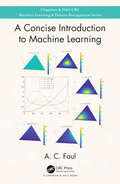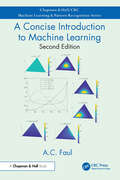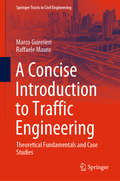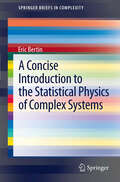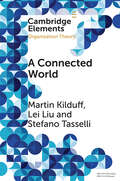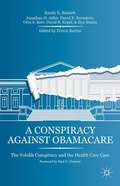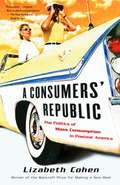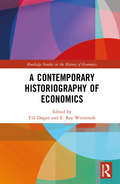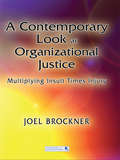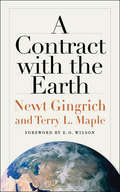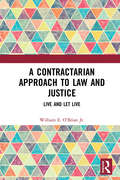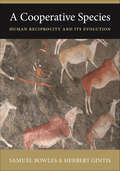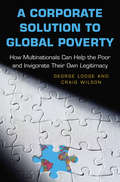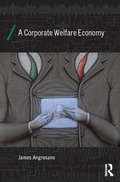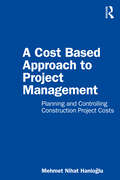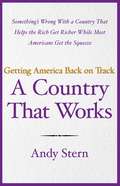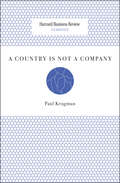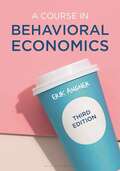- Table View
- List View
A Concise Introduction to Machine Learning
by A.C. FaulThe emphasis of the book is on the question of Why – only if why an algorithm is successful is understood, can it be properly applied, and the results trusted. Algorithms are often taught side by side without showing the similarities and differences between them. This book addresses the commonalities, and aims to give a thorough and in-depth treatment and develop intuition, while remaining concise. This useful reference should be an essential on the bookshelves of anyone employing machine learning techniques. The author's webpage for the book can be accessed here.
A Concise Introduction to Machine Learning (Chapman & Hall/CRC Machine Learning & Pattern Recognition)
by A.C. FaulA Concise Introduction to Machine Learning uses mathematics as the common language to explain a variety of machine learning concepts from basic principles and illustrates every concept using examples in both Python and MATLAB®, which are available on GitHub and can be run from there in Binder in a web browser. Each chapter concludes with exercises to explore the content.The emphasis of the book is on the question of Why—only if “why” an algorithm is successful is understood, can it be properly applied and the results trusted. Standard techniques are treated rigorously, including an introduction to the necessary probability theory. This book addresses the commonalities of methods, aims to give a thorough and in-depth treatment and develop intuition for the inner workings of algorithms, while remaining concise.This useful reference should be essential on the bookshelf of anyone employing machine learning techniques, since it is born out of strong experience in university teaching and research on algorithms, while remaining approachable and readable.
A Concise Introduction to Traffic Engineering: Theoretical Fundamentals and Case Studies (Springer Tracts in Civil Engineering)
by Raffaele Mauro Marco GuerrieriThis book covers a selection of fundamental topics of traffic engineering useful for highways facilities design and control. The treatment is concise but it does not neglect to examine the most recent and crucial theoretical aspects which are at the root of numerous highway engineering applications, like, for instance, the essential aspects of highways traffic stream reliability calculation and automated highway systems control. In order to make these topics easy to follow, several illustrative worked examples of applications are provided in great detail. An intuitive and discursive, rather than formal, style has been adopted throughout the contents. As such, the book offers up-to-date and practical knowledge on several aspects of traffic engineering, which is of interest to a wide audience including students, researchers as well as transportation planners, public transport specialists, city planners and decision-makers.
A Concise Introduction to the Statistical Physics of Complex Systems (SpringerBriefs in Complexity)
by Eric BertinThis concise primer (based on lectures given at summer schools on complex systems and on a masters degree course in complex systems modeling) will provide graduate students and newcomers to the field with the basic knowledge of the concepts and methods of statistical physics and its potential for application to interdisciplinary topics. Indeed, in recent years, statistical physics has begun to attract the interest of a broad community of researchers in the field of complex system sciences, ranging from biology to the social sciences, economics and computer science. More generally, a growing number of graduate students and researchers feel the need to learn some basic concepts and questions originating in other disciplines without necessarily having to master all of the corresponding technicalities and jargon. Generally speaking, the goals of statistical physics may be summarized as follows: on the one hand to study systems composed of a large number of interacting 'entities', and on the other to predict the macroscopic (or collective) behavior of the system considered from the microscopic laws ruling the dynamics of the individual 'entities'. These two goals are, to some extent, also shared by what is nowadays called 'complex systems science' and for these reasons, systems studied in the framework of statistical physics may be considered as among the simplest examples of complex systems--allowing in addition a rather well developed mathematical treatment.
A Connected World: Social Networks and Organizations (Elements in Organization Theory)
by Martin Kilduff Lei Liu Stefano TasselliThis Element synthesizes the current state of research on organizational social networks from its early foundations to contemporary debates. It highlights the characteristics that make the social network perspective distinctive in the organizational research landscape, including its emphasis on structure and outcomes. It covers the main theoretical developments and summarizes the research design questions that organizational researchers face when collecting and analyzing network data. Then, it discusses current debates ranging from agency and structure to network volatility and personality. Finally, the Element envisages future research directions on the role of brokerage for individuals and communities, network cognition, and the importance of past ties. Overall, the Element provides an innovative angle for understanding organizational social networks, engaging in empirical network research, and nurturing further theoretical development on the role of social interactions and connectedness in modern organizations.
A Conspiracy Against Obamacare
by Trevor BurrusThe Affordable Care Act debate was one of the most important and most public examinations of the Constitution in our history. At the forefront of that debate were the bloggers of the Volokh Conspiracy who, from before the law was even passed, engaged in a spirited, erudite, and accessible discussion of the legal issues involved in the case.
A Constructive Meeting: Real World Strategies for Synthesizing Complex Information, Managing Projects under Tight Timelines, and Mitigating Strategic Risks
by Jay Barney Patricia Gorman Clifford"What I Didn't Learn in Business School" is a fictional account that follows new consultant Justin Campbell as he joins an elite team hired by a chemical firm to assess the potential of a newly developed technology. Authors Jay Barney and Trish Gorman Clifford use Justin's story to examine the challenges a recent MBA graduate faces in applying his education on the job-in a way a traditional business book about strategy never could. In this chapter, Justin and his team begin to synthesize all of the information they've gathered on their client organization and its new technology into a set of strategic recommendations. Follow along as the team uncovers holes in their case and divvies up the work that still needs to be done in order to make a defensible initial presentation of their analysis, with a complete assessment of the risk involved, to the client. This chapter was originally published as Chapter 12 of "What I Didn't Learn in Business School: How Strategy Works in the Real World."
A Consumers' Republic: The Politics of Mass Consumption in Postwar America
by Lizabeth CohenIn this signal work of history, Bancroft Prize winner and Pulitzer Prize finalist Lizabeth Cohen shows how the pursuit of prosperity after World War II fueled our pervasive consumer mentality and transformed American life.Trumpeted as a means to promote the general welfare, mass consumption quickly outgrew its economic objectives and became synonymous with patriotism, social equality, and the American Dream. Material goods came to embody the promise of America, and the power of consumers to purchase everything from vacuum cleaners to convertibles gave rise to the power of citizens to purchase political influence and effect social change. Yet despite undeniable successes and unprecedented affluence, mass consumption also fostered economic inequality and the fracturing of society along gender, class, and racial lines. In charting the complex legacy of our "Consumers' Republic" Lizabeth Cohen has written a bold, encompassing, and profoundly influential book.From the Trade Paperback edition.
A Contemporary Historiography of Economics (Routledge Studies in the History of Economics)
by E. Roy Weintraub Till DüppeIn recent years, the focus of historians of economic thought has changed to also include the ideas and practices of contemporary economists. This has opened up new questions regarding the utilization of sources, choice of method, narrative styles, and ethical issues, as well as a new awareness of the historian’s place, role, and task. This book brings together leading contributors to provide, for the first time, a methodological overview of the historiography of economics. Emphasising the quality of the scholarship of recent decades, the book seeks to provide research tools for future historians of economic thought, as well as to any historians of social science with an interest in historiographic issues.
A Contemporary Look at Organizational Justice: Multiplying Insult Times Injury (Organization and Management Series)
by Joel BrocknerThis book is for scholars with an interest in the burgeoning area of theory and research on organizational justice. The ideas it describes forge connections between the justice literature and other prominent bodies of knowledge in organizational and social psychology, including those pertaining to trust, social identity, attribution theory, regulatory focus theory and cross-cultural differences in people's beliefs and behaviors. Though intended primarily for researchers, this book is written in a very accessible way, so that informed practitioners will gain considerable value from it.
A Contest of Ideas: Capital, Politics and Labor
by Nelson LichtensteinFor more than thirty years Nelson Lichtenstein has deployed his scholarship--on labor, politics, and social thought--to chart the history and prospects of a progressive America. A Contest of Ideas collects and updates many of Lichtenstein's most provocative and controversial essays and reviews. These incisive writings link the fate of the labor movement to the transformations in the shape of world capitalism, to the rise of the civil rights movement, and to the activists and intellectuals who have played such important roles. Tracing broad patterns of political thought, Lichtenstein offers important perspectives on the relationship of labor and the state, the tensions that sometimes exist between a culture of rights and the idea of solidarity, and the rise of conservatism in politics, law, and intellectual life. The volume closes with portraits of five activist intellectuals whose work has been vital to the conflicts that engage the labor movement, public policy, and political culture.
A Contingency Theory of Leadership
by Jay W. LorschThe idea of a contingency theory of leadership is not new. In the 1960s several scholars, most notably Frederick Fiedler, argued that effective leadership style depended on situational contingencies, such as the nature of the task-specifically, how certain or uncertain it was. But agreement ended there, as researchers and scholars failed to reach a consensus on what leaders' primary tasks were or on which contingency factors influenced them most. This chapter picks up where those scholars left off, as author and Harvard Business School professor Jay Lorsch places the leader's relationship with followers firmly in the center of his analysis. According to Lorsch, followers' values and expectations must align with the goals set by the leader, communication between the parties must be strong, and the leader must draw effectively on power as a function of position (a directive approach) and on influence through perceived competence and charisma (a participative approach). The appropriate mix will depend on four contingent factors: 1) the leader's power and influence and his or her chosen goals, 2) the followers' expectations, 3) the complexity of the organization, and 4) the certainty or uncertainty of the task. This chapter was originally published as Chapter 15 of "Handbook of Leadership Theory and Practice: A Harvard Business School Centennial Colloquium."
A Continuous Time Econometric Model of the United Kingdom with Stochastic Trends
by Albert Rex Bergstrom Khalid Ben NowmanOver the last thirty years there has been extensive use of continuous time econometric methods in macroeconomic modelling. This 2007 monograph presents a continuous time macroeconometric model of the United Kingdom incorporating stochastic trends. Its development represents a major step forward in continuous time macroeconomic modelling. The book describes the model in detail and, like earlier models, it is designed in such a way as to permit a rigorous mathematical analysis of its steady-state and stability properties, thus providing a valuable check on the capacity of the model to generate plausible long-run behaviour. The model is estimated using newly developed exact Gaussian estimation methods for continuous time econometric models incorporating unobservable stochastic trends. The book also includes discussion of the application of the model to dynamic analysis and forecasting.
A Contract with the Earth
by Newt Gingrich Terry L. MapleFocusing the environmental debate on the principle of common commitment, former Speaker of the House Newt Gingrich and eminent conservationist Terry L. Maple present A Contract with the Earth. They declare a need for bipartisan environmentalism—a new era of environmental stewardship with principles that they believe most Americans will share. While acknowledging that liberals and conservatives do not see eye to eye on many issues, Gingrich and Maple argue successfully that environmental stewardship is a mainstream value that transcends partisan politics. Their thoughtful approaches to our environmental challenges are based on three main premises: environmental leadership is integral to America's role in the world, technologically savvy environmental entrepreneurs can and should be the cornerstone of environmental solutions, and cooperation and incentives must be dramatically increased to achieve workable and broadly supported environmental solutions.Gingrich and Maple believe that most people—regardless of how they categorize themselves politically—are weary of the legal and political conflicts that prevent individuals and communities from realizing the benefits of environmental conservation. The foundation of the book—a ten-point Contract with the Earth—promotes ingenuity over rhetoric as the way forward.
A Contractarian Approach to Law and Justice: Live and Let Live
by William E. O’Brian Jr.This book presents a distinctive version of a contractarian approach to law and justice. The work argues that law and justice are social norms that arise from a process of social evolution, and are binding only if and to the extent that they are mutually beneficial. It explicitly rejects accounts of law and justice that are based on morality, on the basis that morality itself is only legitimately founded on mutual advantage. But it also rejects most existing versions of contractarianism, which are based on ideas of hypothetical agreements by rational contractors, in favour of an approach that is based on actually existing social norms, but advocates critically examining these norms and discarding those that are not truly mutually beneficial. The first half of the book develops the approach, while the second half explores some of its implications for law. It argues for a left-libertarian approach to property, an approach largely based on the common law of tort, contract and criminal law, and a rejection of most statutory law, which is based not on mutual advantage but rather on benefiting some at the expense of others. However, it ultimately recognises that there are those who want a more extensive state than this approach allows, and advocates a strong form of federalism to allow this, provided robust exit rights are provided. The book combines political philosophy, economics and law into an approach that is broadly libertarian but distinctive in many respects. It will be of interest to scholars in all three of those disciplines.
A Conversation with Ellen J. Kullman, Chairman & CEO of DuPont, 2009-2015
by Lynn S. Paine Will HurwitzEllen J. Kullman, the retired Chairman and CEO of DuPont, describes how she guided the storied science and technology company through a contentious proxy battle with activist investor Trian Partners, which acquired DuPont shares in 2013 and sought to break up the company. Trian's pursuit of board seats led to a 2015 shareholder vote, which DuPont won under Kullman's leadership. In a sweeping interview with Professor Lynn S. Paine, Kullman describes lessons from her experiences navigating the proxy contest that captured national attention as well as about working with your board, setting company strategy, leading a large corporation, evaluating time frames for shareholder returns, measuring stakeholder performance, assessing shareholder engagement, considering joining a new board and boardroom dynamics, and understanding how boards have changed over the years.
A Cooperative Species: Human Reciprocity and Its Evolution
by Samuel Bowles Herbert GintisA fascinating look at the evolutionary origins of cooperationWhy do humans, uniquely among animals, cooperate in large numbers to advance projects for the common good? Contrary to the conventional wisdom in biology and economics, this generous and civic-minded behavior is widespread and cannot be explained simply by far-sighted self-interest or a desire to help close genealogical kin.In A Cooperative Species, Samuel Bowles and Herbert Gintis—pioneers in the new experimental and evolutionary science of human behavior—show that the central issue is not why selfish people act generously, but instead how genetic and cultural evolution has produced a species in which substantial numbers make sacrifices to uphold ethical norms and to help even total strangers.The authors describe how, for thousands of generations, cooperation with fellow group members has been essential to survival. Groups that created institutions to protect the civic-minded from exploitation by the selfish flourished and prevailed in conflicts with less cooperative groups. Key to this process was the evolution of social emotions such as shame and guilt, and our capacity to internalize social norms so that acting ethically became a personal goal rather than simply a prudent way to avoid punishment.Using experimental, archaeological, genetic, and ethnographic data to calibrate models of the coevolution of genes and culture as well as prehistoric warfare and other forms of group competition, A Cooperative Species provides a compelling and novel account of how humans came to be moral and cooperative.
A Corporate Solution to Global Poverty: How Multinationals Can Help the Poor and Invigorate Their Own Legitimacy
by Craig Wilson George LodgeWorld leaders have given the reduction of global poverty top priority. And yet it persists. Indeed, in many countries whose governments lack either the desire or the ability to act, poverty has worsened. This book, a joint venture of a Harvard professor and an economist with the International Finance Corporation, argues that the solution lies in the creation of a new institution, the World Development Corporation (WDC), a partnership of multinational corporations (MNCs), international development agencies, and nongovernmental organizations (NGOs). In A Corporate Solution to Global Poverty, George Lodge and Craig Wilson assert that MNCs have the critical combination of capabilities required to build investment, grow economies, and create jobs in poor countries, and thus to reduce poverty. Furthermore, they can do so profitably and thus sustainably. But they lack legitimacy and risk can be high, and so a collective approach is better than one in which an individual company proceeds alone. Thus a UN-sponsored WDC, owned and managed by a dozen or so MNCs with NGO support, will make a marked difference. At a time when big business has been demonized for destroying the environment, enjoying one-sided benefits from globalization, and deceiving investors, the book argues, MNCs have much to gain from becoming more effective in reducing global poverty. This is not a call for philanthropy. Lodge and Wilson believe that corporate support for the World Development Corporation will benefit not only the world's poor but also company shareholders as a result of improved MNC legitimacy and stronger markets and profitability.
A Corporate Welfare Economy (Economics as Social Theory)
by James AngresanoAlthough political rhetoric and public perception continue to assume that the United States is the very definition of a free market economy, a different system entirely has in actuality come to prominence over the past half century. This Corporate Welfare Economy (CWE) has come about as government come increasingly under the influence of corporate interests and lobbyists, with supposedly equalising factors such as regulation skewed in order to suit the interests of the privileged while an overwhelming majority of US citizens have experienced a decline in their standard of living. James Angresano examines the characteristics of this mode of capitalism, both from the theoretical point of view but also with key reference to the different sectors of the economy – trade, manufacturing, industry and defense among them.
A Cost Based Approach to Project Management: Planning and Controlling Construction Project Costs
by Mehmet Nihat HaniogluA Cost Based Approach to Project Management: Planning and Controlling Construction Project Costs introduces early-career architects, construction managers, civil engineers, and facility managers to the essentials of delivering projects on-time and at cost. Drawing on the author’s decades of experience managing marquee building and infrastructure projects around the world, this primer offers busy professionals a crash course in budgeting, cost estimating, scheduling, and cost control. Chapters break down the details of cost elements, structuring project costs, and integrating budget with schedule, providing novice project managers with the key skills to plan and execute construction projects with confidence and precision. Features: Illustrates the principles of project management and the essentials of cost planning and control with easy-to-understand examples from the construction industry Includes step-by-step details of project planning, cost estimating, and management processes Offers clear, cost-based methods for defining scope, preparing bids, and planning for contingencies, as well as monitoring progress and determining when to take remedial action Contains a user-friendly guide to project management acronyms and terminology Provides sample construction schedules, budgets, and progress report forms An ideal resource for self-study, on-the-job training, or courses in construction, architecture, or civil engineering project management, A Cost Based Approach to Project Management makes a worthy addition to the aspiring project manager’s reference shelf.
A Country That Works
by Andy SternAndy Stern, one of the most visionary leaders in America today, has fought relentlessly to ensure that Americans' hard work is rewarded in today's hypercompetitive, globalized world. As the newsmaking president of the fastest-growing, most dynamic union in America, he has led the charge for modernizing the "house of labor" -- taking unions out of the past and into the twenty-first century. He has spearheaded the campaign against the "Wal-Marting" of jobs and has innovated transformative solutions to the daunting problems facing Americans, from job insecurity to runaway health care costs. In this powerful critique and call-to-arms, he offers a revelatory dissection of the gathering threats to our standard of living -- threats that our politicians have failed utterly to address -- and he puts forth a bold, unassailable plan for making vital reforms. In his eye-opening diagnosis that makes the urgency of the threats vividly clear, Stern shows that Americans are contending with the most disruptive economic upheaval in the world economy since the Industrial Revolution. Yet, in the face of this daunting challenge, the American system simply isn't working well enough for most of us. Stern powerfully portrays how with the pace of globalization relentlessly quickening, the competitive pressures on our jobs and quality of life are heating up even more, especially as housing, health care, and oil prices skyrocket. While CEO salaries soar and business and the wealthy are handed plentiful tax shelters, the incomes of both white-collar and blue-collar workers stagnate, leaving most Americans struggling to pay off ever-escalating debt, instead of saving for retirement. The plain fact is that our system is out of whack, serving the interests of the top sliver of the most wealthy while putting the squeeze on the rest of us. Meanwhile, our politicians irresponsibly sidestep the crucial solutions that we so desperately need in order to make sure Americans can move into the twenty-first century with their futures secure. As Stern so persuasively shows, it is time for bold thinking and creative solutions to overhaul a health care system in crisis; correct a tax system rigged in favor of business and the wealthy; revamp our inadequate retirement system; and make truly innovative improvements in education. He presents a set of course-correction reforms so compelling, simple, and achievable that readers will find themselves enraged that they haven't yet been enacted. Americans have a right to expect our government to work for us. Andy Stern shows how we can get things back on track to make sure it does.
A Country is Not a Company (Harvard Business Review Classics)
by Paul KrugmanNobel-Prize-winning economist Paul Krugman argues that business leaders need to understand the differences between economic policy on the national and international scale and business strategy on the organizational scale. Economists deal with the closed system of a national economy, whereas executives live in the open-system world of business. Moreover, economists know that an economy must be run on the basis of general principles, but businesspeople are forever in search of the particularbrilliant strategy. Krugman's article serves to elucidate the world of economics for businesspeople who are so close to it and yet are continually frustrated by what they see. Since 1922,Harvard Business Review has been a leading source of breakthrough management ideas-many of which still speak to and influence us today. The Harvard Business Review Classics series now offers readers the opportunity to make these seminal pieces a part of your permanent management library. Each highly readable volume contains a groundbreaking idea that continues to shape best practices and inspire countless managers around the world-and will have a direct impact on you today and for years to come.
A Couple With Common Cents: A Short Story About Abundant Hope in Your Family Finances
by Ryan EidsonHow Does a Husband and Wife Come to an Agreement About Money? Tabitha is a young mother of two who struggles with her family's finances every day. She's tried to talk with her husband, Jack, about their money struggles, but he won't listen. A friend of Tabitha's invites her to a weekend women's conference.?How can Tabitha take off work and go to this conference, when she doesn't have the cash to go, and can't miss a day of work because their money is so tight?Find out how she overcomes these problems in "A Couple with Common Cents".
A Course in Behavioral Economics
by Erik AngnerThis textbook looks at decisions – how we make them, and what makes them good or bad. In this bestselling introduction, Erik Angner clearly lays out the theory of behavioral economics and explains the intuitions behind it. The book offers a rich tapestry of examples, exercises, and problems drawn from fields such as economics, management, marketing, political science, and public policy. It shows how to apply the principles of behavioral economics to improve your life and work – and to make the world a better place to boot. No advanced mathematics is required. <p><p>This is an ideal textbook for students coming to behavioral economics from various fields. It can be used on its own in introductory courses, or in combination with other texts at advanced undergraduate and postgraduate levels. It is equally suitable for general readers who have been captivated by popular-science books on behavioral economics and want to know more about this intriguing subject. <p><p>New to this Edition: <p><p>- An updated chapter on behavioral policy and the nudge agenda. <p><p>- Several new sections, for example on the economics of happiness. <p><p>- Updated examples and exercises, with an expanded answer key <p><p>- Refreshed ancillary resources make for a plug and play experience for instructors teaching behavioral economics for the first time.
A Course in Environmental Economics
by Daniel J. Phaneuf Till RequateThis unique graduate textbook offers a compelling narrative of the growing field of environmental economics that integrates theory, policy, and empirical topics. Daniel J. Phaneuf and Till Requate present both traditional and emerging perspectives, incorporating cutting-edge research in a way that allows students to easily identify connections and common themes. Their comprehensive approach gives instructors the flexibility to cover a range of topics, including important issues - such as tax interaction, environmental liability rules, modern treatments of incomplete information, technology adoption and innovation, and international environmental problems - that are not discussed in other graduate-levels texts. Numerous data-based examples and end-of-chapter exercises show students how theoretical and applied research findings are complementary, and will enable them to develop skills and interests in all areas of the field. Additional data sets and exercises can be accessed online, providing ample opportunity for practice.
